The State of Startup Financing Following Brexit: An Investigation
VerifiedAdded on 2023/01/18
|72
|18436
|59
Project
AI Summary
This research project investigates the effects of Brexit on startup financing within the United Kingdom. The study begins with an introduction to Brexit, its background, and the context of startups in the UK, highlighting their significance to the economy. It explores the rationale, problem statement, research aims, objectives, questions, and hypotheses related to the impact of Brexit on startup funding. The literature review examines the general concept of Brexit, startup financing, and their intersection. The methodology section outlines the research approach, design, philosophy, and data collection methods, including primary research and data analysis techniques like correlation and regression. The results and discussion chapter presents descriptive statistics, correlation analyses, and regression analyses to determine the relationship between Brexit and startup financing. The conclusion summarizes the findings, provides recommendations for improving startup financing post-Brexit, and suggests areas for future research. The project considers the impact on the UK's economy, investment, and the future of startups. The research aims to determine if Brexit had a positive or negative effect on startups and offers insights for investors and policymakers. The study's findings highlight the need for strategies to mitigate the negative impacts and encourage startup growth.
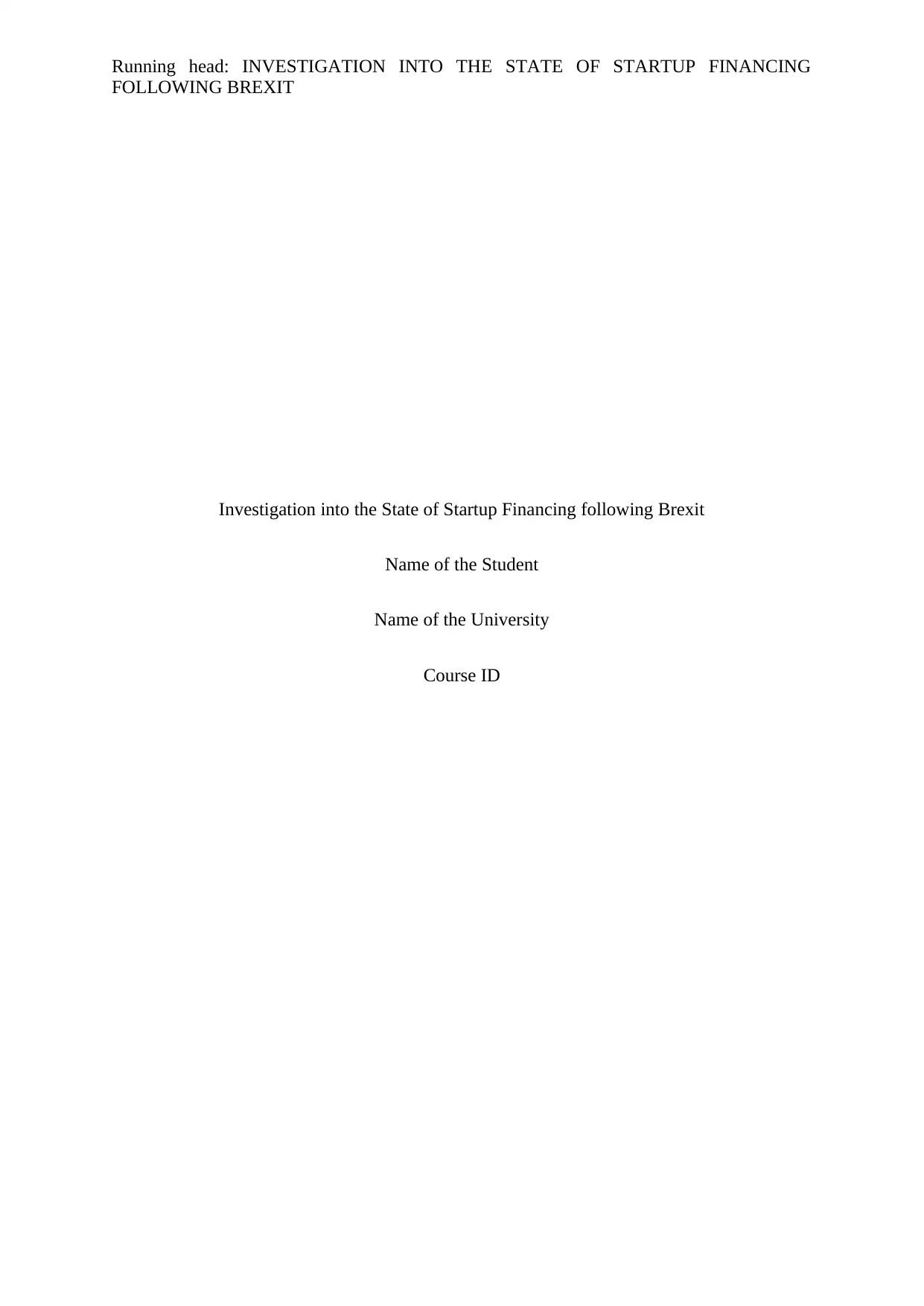
Running head: INVESTIGATION INTO THE STATE OF STARTUP FINANCING
FOLLOWING BREXIT
Investigation into the State of Startup Financing following Brexit
Name of the Student
Name of the University
Course ID
FOLLOWING BREXIT
Investigation into the State of Startup Financing following Brexit
Name of the Student
Name of the University
Course ID
Paraphrase This Document
Need a fresh take? Get an instant paraphrase of this document with our AI Paraphraser
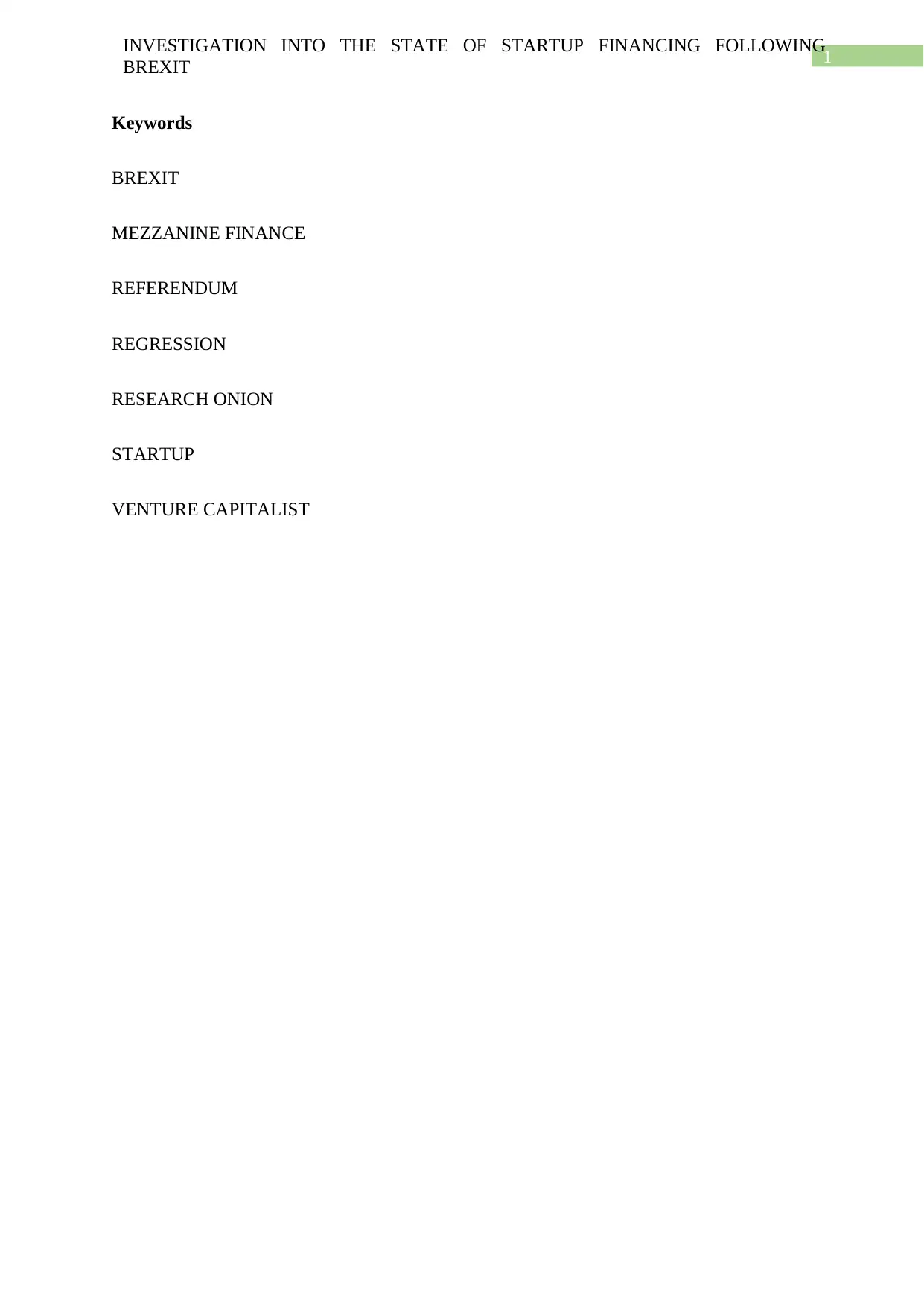
1
INVESTIGATION INTO THE STATE OF STARTUP FINANCING FOLLOWING
BREXIT
Keywords
BREXIT
MEZZANINE FINANCE
REFERENDUM
REGRESSION
RESEARCH ONION
STARTUP
VENTURE CAPITALIST
INVESTIGATION INTO THE STATE OF STARTUP FINANCING FOLLOWING
BREXIT
Keywords
BREXIT
MEZZANINE FINANCE
REFERENDUM
REGRESSION
RESEARCH ONION
STARTUP
VENTURE CAPITALIST
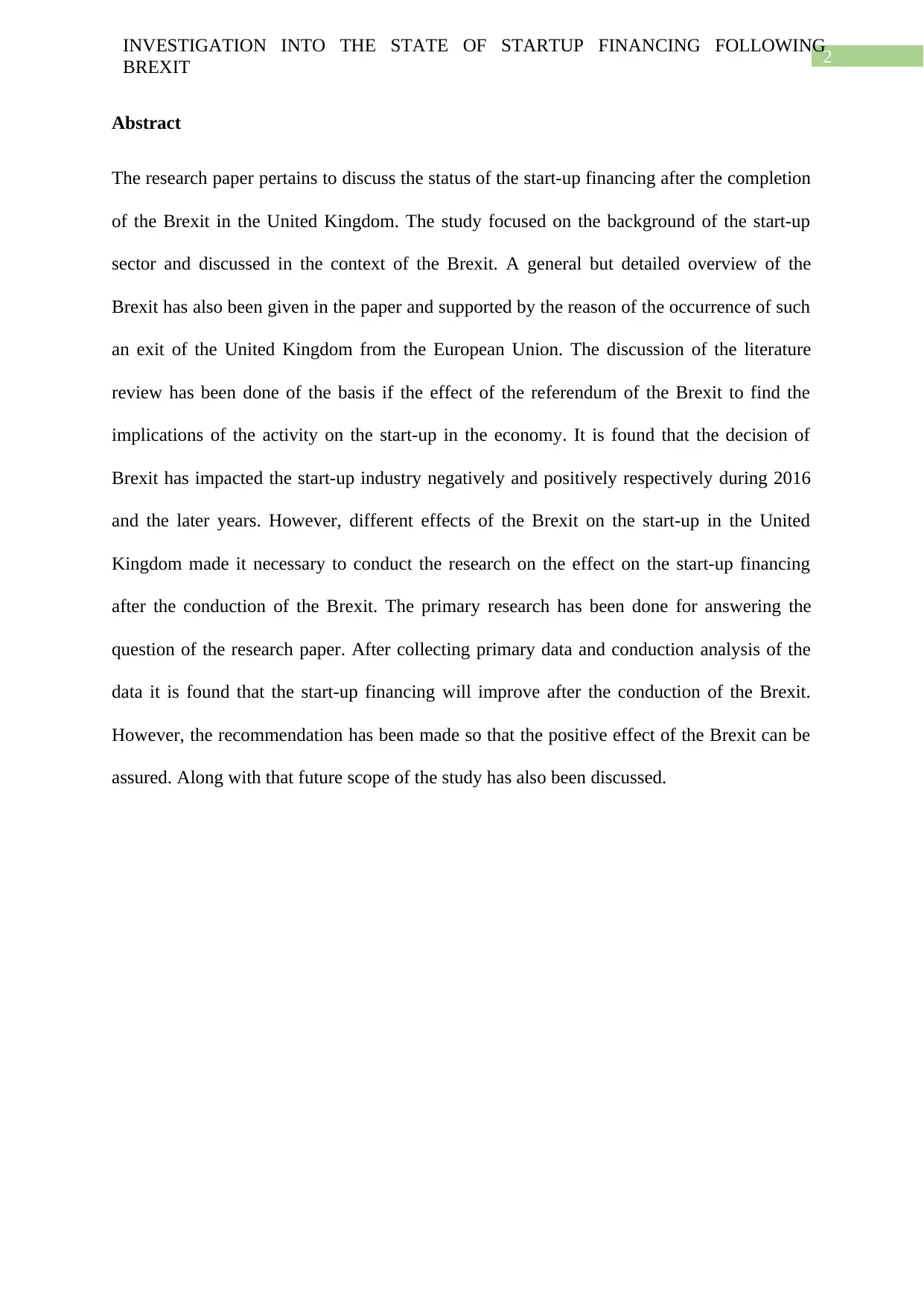
2
INVESTIGATION INTO THE STATE OF STARTUP FINANCING FOLLOWING
BREXIT
Abstract
The research paper pertains to discuss the status of the start-up financing after the completion
of the Brexit in the United Kingdom. The study focused on the background of the start-up
sector and discussed in the context of the Brexit. A general but detailed overview of the
Brexit has also been given in the paper and supported by the reason of the occurrence of such
an exit of the United Kingdom from the European Union. The discussion of the literature
review has been done of the basis if the effect of the referendum of the Brexit to find the
implications of the activity on the start-up in the economy. It is found that the decision of
Brexit has impacted the start-up industry negatively and positively respectively during 2016
and the later years. However, different effects of the Brexit on the start-up in the United
Kingdom made it necessary to conduct the research on the effect on the start-up financing
after the conduction of the Brexit. The primary research has been done for answering the
question of the research paper. After collecting primary data and conduction analysis of the
data it is found that the start-up financing will improve after the conduction of the Brexit.
However, the recommendation has been made so that the positive effect of the Brexit can be
assured. Along with that future scope of the study has also been discussed.
INVESTIGATION INTO THE STATE OF STARTUP FINANCING FOLLOWING
BREXIT
Abstract
The research paper pertains to discuss the status of the start-up financing after the completion
of the Brexit in the United Kingdom. The study focused on the background of the start-up
sector and discussed in the context of the Brexit. A general but detailed overview of the
Brexit has also been given in the paper and supported by the reason of the occurrence of such
an exit of the United Kingdom from the European Union. The discussion of the literature
review has been done of the basis if the effect of the referendum of the Brexit to find the
implications of the activity on the start-up in the economy. It is found that the decision of
Brexit has impacted the start-up industry negatively and positively respectively during 2016
and the later years. However, different effects of the Brexit on the start-up in the United
Kingdom made it necessary to conduct the research on the effect on the start-up financing
after the conduction of the Brexit. The primary research has been done for answering the
question of the research paper. After collecting primary data and conduction analysis of the
data it is found that the start-up financing will improve after the conduction of the Brexit.
However, the recommendation has been made so that the positive effect of the Brexit can be
assured. Along with that future scope of the study has also been discussed.
⊘ This is a preview!⊘
Do you want full access?
Subscribe today to unlock all pages.

Trusted by 1+ million students worldwide
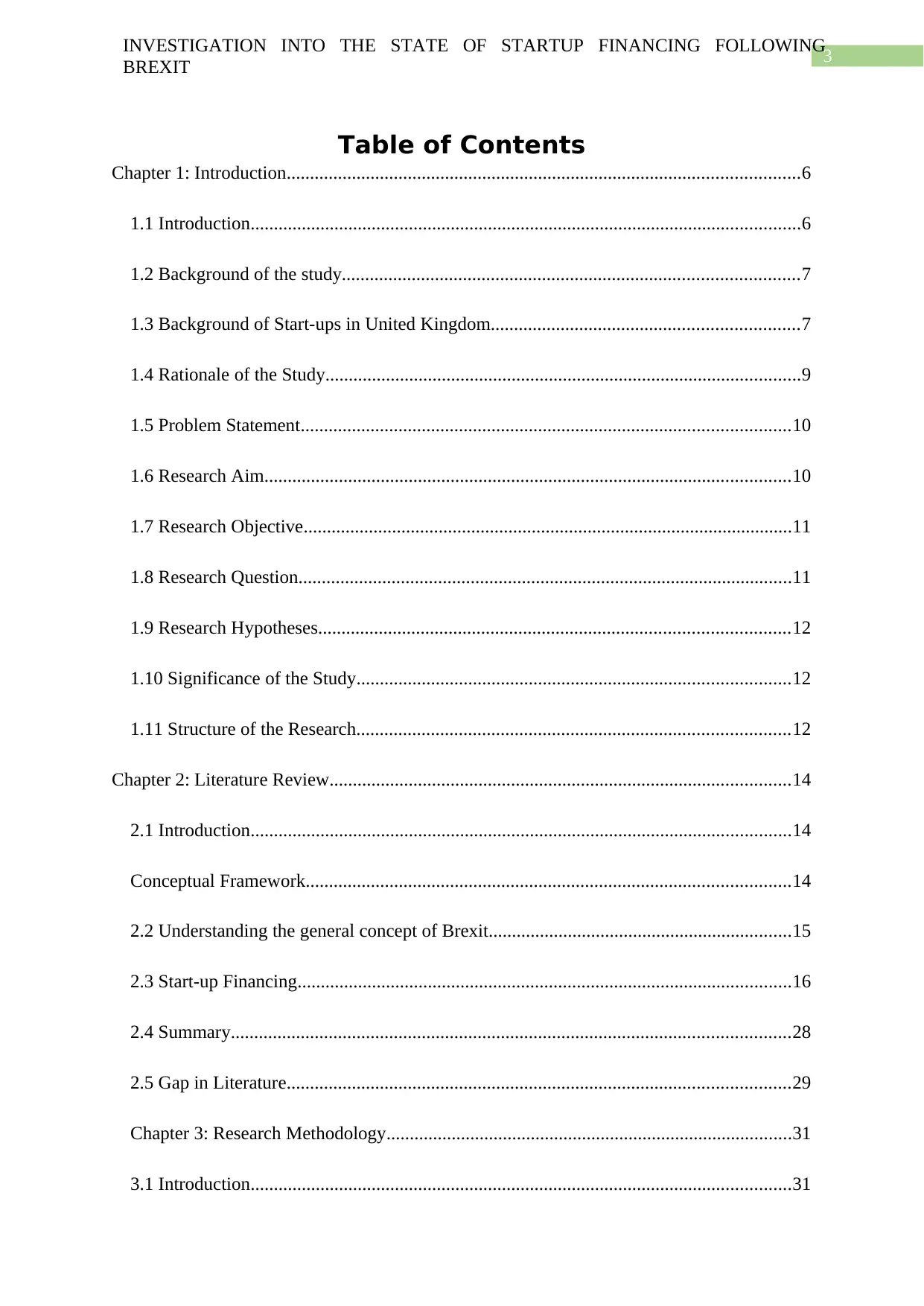
3
INVESTIGATION INTO THE STATE OF STARTUP FINANCING FOLLOWING
BREXIT
Table of Contents
Chapter 1: Introduction..............................................................................................................6
1.1 Introduction......................................................................................................................6
1.2 Background of the study..................................................................................................7
1.3 Background of Start-ups in United Kingdom..................................................................7
1.4 Rationale of the Study......................................................................................................9
1.5 Problem Statement.........................................................................................................10
1.6 Research Aim.................................................................................................................10
1.7 Research Objective.........................................................................................................11
1.8 Research Question..........................................................................................................11
1.9 Research Hypotheses.....................................................................................................12
1.10 Significance of the Study.............................................................................................12
1.11 Structure of the Research.............................................................................................12
Chapter 2: Literature Review...................................................................................................14
2.1 Introduction....................................................................................................................14
Conceptual Framework........................................................................................................14
2.2 Understanding the general concept of Brexit.................................................................15
2.3 Start-up Financing..........................................................................................................16
2.4 Summary........................................................................................................................28
2.5 Gap in Literature............................................................................................................29
Chapter 3: Research Methodology.......................................................................................31
3.1 Introduction....................................................................................................................31
INVESTIGATION INTO THE STATE OF STARTUP FINANCING FOLLOWING
BREXIT
Table of Contents
Chapter 1: Introduction..............................................................................................................6
1.1 Introduction......................................................................................................................6
1.2 Background of the study..................................................................................................7
1.3 Background of Start-ups in United Kingdom..................................................................7
1.4 Rationale of the Study......................................................................................................9
1.5 Problem Statement.........................................................................................................10
1.6 Research Aim.................................................................................................................10
1.7 Research Objective.........................................................................................................11
1.8 Research Question..........................................................................................................11
1.9 Research Hypotheses.....................................................................................................12
1.10 Significance of the Study.............................................................................................12
1.11 Structure of the Research.............................................................................................12
Chapter 2: Literature Review...................................................................................................14
2.1 Introduction....................................................................................................................14
Conceptual Framework........................................................................................................14
2.2 Understanding the general concept of Brexit.................................................................15
2.3 Start-up Financing..........................................................................................................16
2.4 Summary........................................................................................................................28
2.5 Gap in Literature............................................................................................................29
Chapter 3: Research Methodology.......................................................................................31
3.1 Introduction....................................................................................................................31
Paraphrase This Document
Need a fresh take? Get an instant paraphrase of this document with our AI Paraphraser
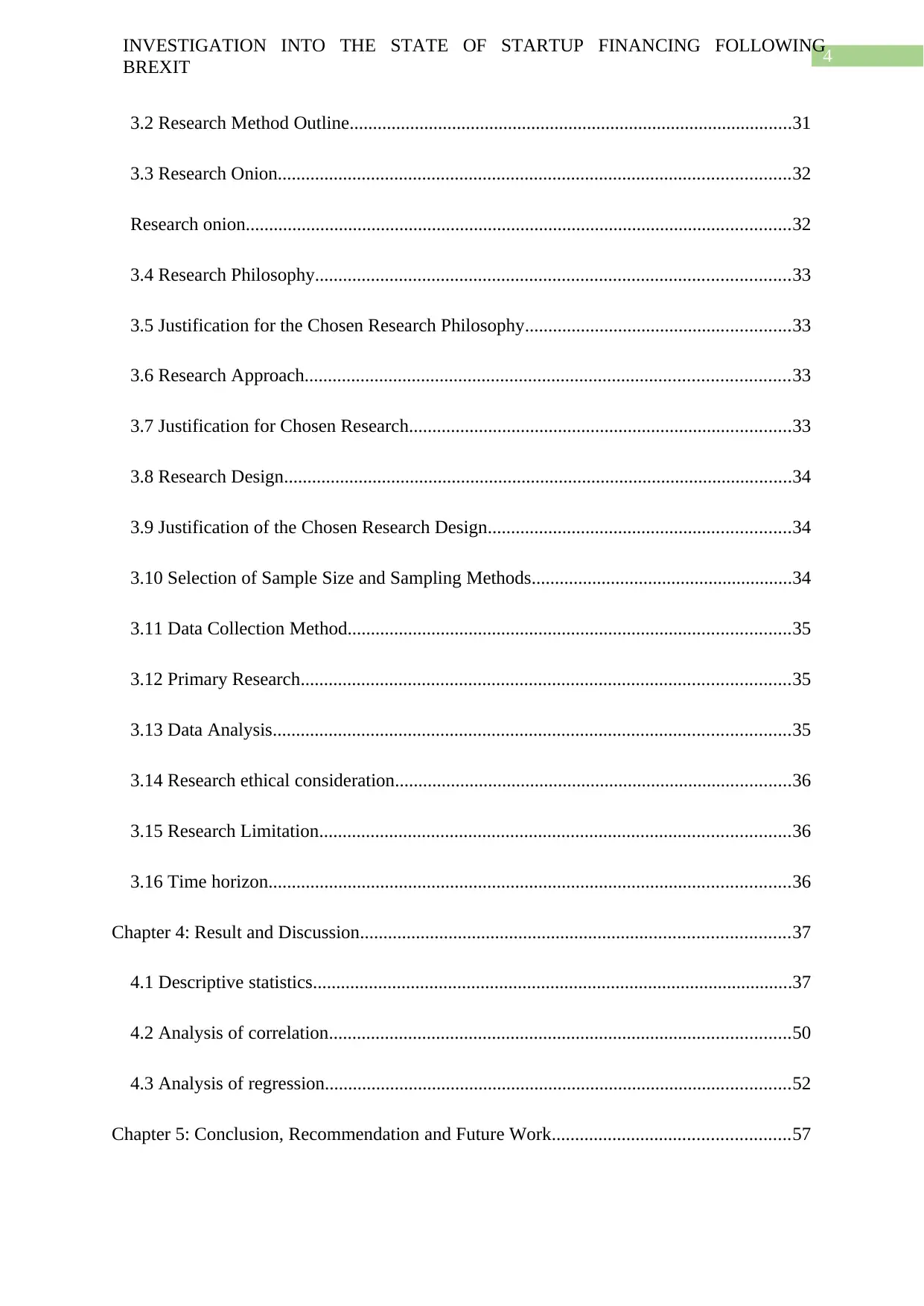
4
INVESTIGATION INTO THE STATE OF STARTUP FINANCING FOLLOWING
BREXIT
3.2 Research Method Outline...............................................................................................31
3.3 Research Onion..............................................................................................................32
Research onion.....................................................................................................................32
3.4 Research Philosophy......................................................................................................33
3.5 Justification for the Chosen Research Philosophy.........................................................33
3.6 Research Approach........................................................................................................33
3.7 Justification for Chosen Research..................................................................................33
3.8 Research Design.............................................................................................................34
3.9 Justification of the Chosen Research Design.................................................................34
3.10 Selection of Sample Size and Sampling Methods........................................................34
3.11 Data Collection Method...............................................................................................35
3.12 Primary Research.........................................................................................................35
3.13 Data Analysis...............................................................................................................35
3.14 Research ethical consideration.....................................................................................36
3.15 Research Limitation.....................................................................................................36
3.16 Time horizon................................................................................................................36
Chapter 4: Result and Discussion............................................................................................37
4.1 Descriptive statistics.......................................................................................................37
4.2 Analysis of correlation...................................................................................................50
4.3 Analysis of regression....................................................................................................52
Chapter 5: Conclusion, Recommendation and Future Work...................................................57
INVESTIGATION INTO THE STATE OF STARTUP FINANCING FOLLOWING
BREXIT
3.2 Research Method Outline...............................................................................................31
3.3 Research Onion..............................................................................................................32
Research onion.....................................................................................................................32
3.4 Research Philosophy......................................................................................................33
3.5 Justification for the Chosen Research Philosophy.........................................................33
3.6 Research Approach........................................................................................................33
3.7 Justification for Chosen Research..................................................................................33
3.8 Research Design.............................................................................................................34
3.9 Justification of the Chosen Research Design.................................................................34
3.10 Selection of Sample Size and Sampling Methods........................................................34
3.11 Data Collection Method...............................................................................................35
3.12 Primary Research.........................................................................................................35
3.13 Data Analysis...............................................................................................................35
3.14 Research ethical consideration.....................................................................................36
3.15 Research Limitation.....................................................................................................36
3.16 Time horizon................................................................................................................36
Chapter 4: Result and Discussion............................................................................................37
4.1 Descriptive statistics.......................................................................................................37
4.2 Analysis of correlation...................................................................................................50
4.3 Analysis of regression....................................................................................................52
Chapter 5: Conclusion, Recommendation and Future Work...................................................57

5
INVESTIGATION INTO THE STATE OF STARTUP FINANCING FOLLOWING
BREXIT
5.1 Conclusion......................................................................................................................57
5.2 Recommendation............................................................................................................59
5.3 Future Work...................................................................................................................60
References................................................................................................................................61
Appendix..................................................................................................................................66
INVESTIGATION INTO THE STATE OF STARTUP FINANCING FOLLOWING
BREXIT
5.1 Conclusion......................................................................................................................57
5.2 Recommendation............................................................................................................59
5.3 Future Work...................................................................................................................60
References................................................................................................................................61
Appendix..................................................................................................................................66
⊘ This is a preview!⊘
Do you want full access?
Subscribe today to unlock all pages.

Trusted by 1+ million students worldwide
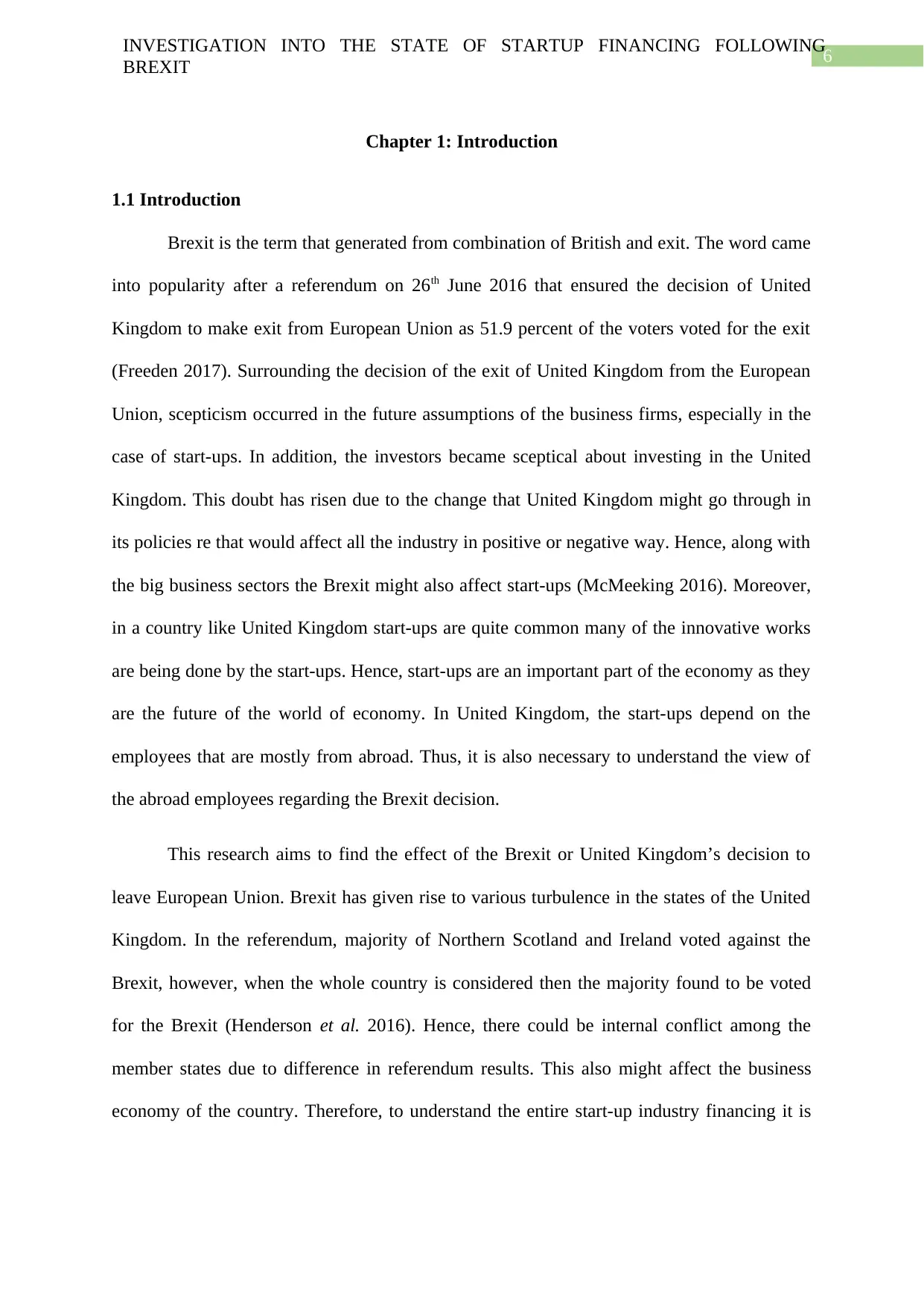
6
INVESTIGATION INTO THE STATE OF STARTUP FINANCING FOLLOWING
BREXIT
Chapter 1: Introduction
1.1 Introduction
Brexit is the term that generated from combination of British and exit. The word came
into popularity after a referendum on 26th June 2016 that ensured the decision of United
Kingdom to make exit from European Union as 51.9 percent of the voters voted for the exit
(Freeden 2017). Surrounding the decision of the exit of United Kingdom from the European
Union, scepticism occurred in the future assumptions of the business firms, especially in the
case of start-ups. In addition, the investors became sceptical about investing in the United
Kingdom. This doubt has risen due to the change that United Kingdom might go through in
its policies re that would affect all the industry in positive or negative way. Hence, along with
the big business sectors the Brexit might also affect start-ups (McMeeking 2016). Moreover,
in a country like United Kingdom start-ups are quite common many of the innovative works
are being done by the start-ups. Hence, start-ups are an important part of the economy as they
are the future of the world of economy. In United Kingdom, the start-ups depend on the
employees that are mostly from abroad. Thus, it is also necessary to understand the view of
the abroad employees regarding the Brexit decision.
This research aims to find the effect of the Brexit or United Kingdom’s decision to
leave European Union. Brexit has given rise to various turbulence in the states of the United
Kingdom. In the referendum, majority of Northern Scotland and Ireland voted against the
Brexit, however, when the whole country is considered then the majority found to be voted
for the Brexit (Henderson et al. 2016). Hence, there could be internal conflict among the
member states due to difference in referendum results. This also might affect the business
economy of the country. Therefore, to understand the entire start-up industry financing it is
INVESTIGATION INTO THE STATE OF STARTUP FINANCING FOLLOWING
BREXIT
Chapter 1: Introduction
1.1 Introduction
Brexit is the term that generated from combination of British and exit. The word came
into popularity after a referendum on 26th June 2016 that ensured the decision of United
Kingdom to make exit from European Union as 51.9 percent of the voters voted for the exit
(Freeden 2017). Surrounding the decision of the exit of United Kingdom from the European
Union, scepticism occurred in the future assumptions of the business firms, especially in the
case of start-ups. In addition, the investors became sceptical about investing in the United
Kingdom. This doubt has risen due to the change that United Kingdom might go through in
its policies re that would affect all the industry in positive or negative way. Hence, along with
the big business sectors the Brexit might also affect start-ups (McMeeking 2016). Moreover,
in a country like United Kingdom start-ups are quite common many of the innovative works
are being done by the start-ups. Hence, start-ups are an important part of the economy as they
are the future of the world of economy. In United Kingdom, the start-ups depend on the
employees that are mostly from abroad. Thus, it is also necessary to understand the view of
the abroad employees regarding the Brexit decision.
This research aims to find the effect of the Brexit or United Kingdom’s decision to
leave European Union. Brexit has given rise to various turbulence in the states of the United
Kingdom. In the referendum, majority of Northern Scotland and Ireland voted against the
Brexit, however, when the whole country is considered then the majority found to be voted
for the Brexit (Henderson et al. 2016). Hence, there could be internal conflict among the
member states due to difference in referendum results. This also might affect the business
economy of the country. Therefore, to understand the entire start-up industry financing it is
Paraphrase This Document
Need a fresh take? Get an instant paraphrase of this document with our AI Paraphraser
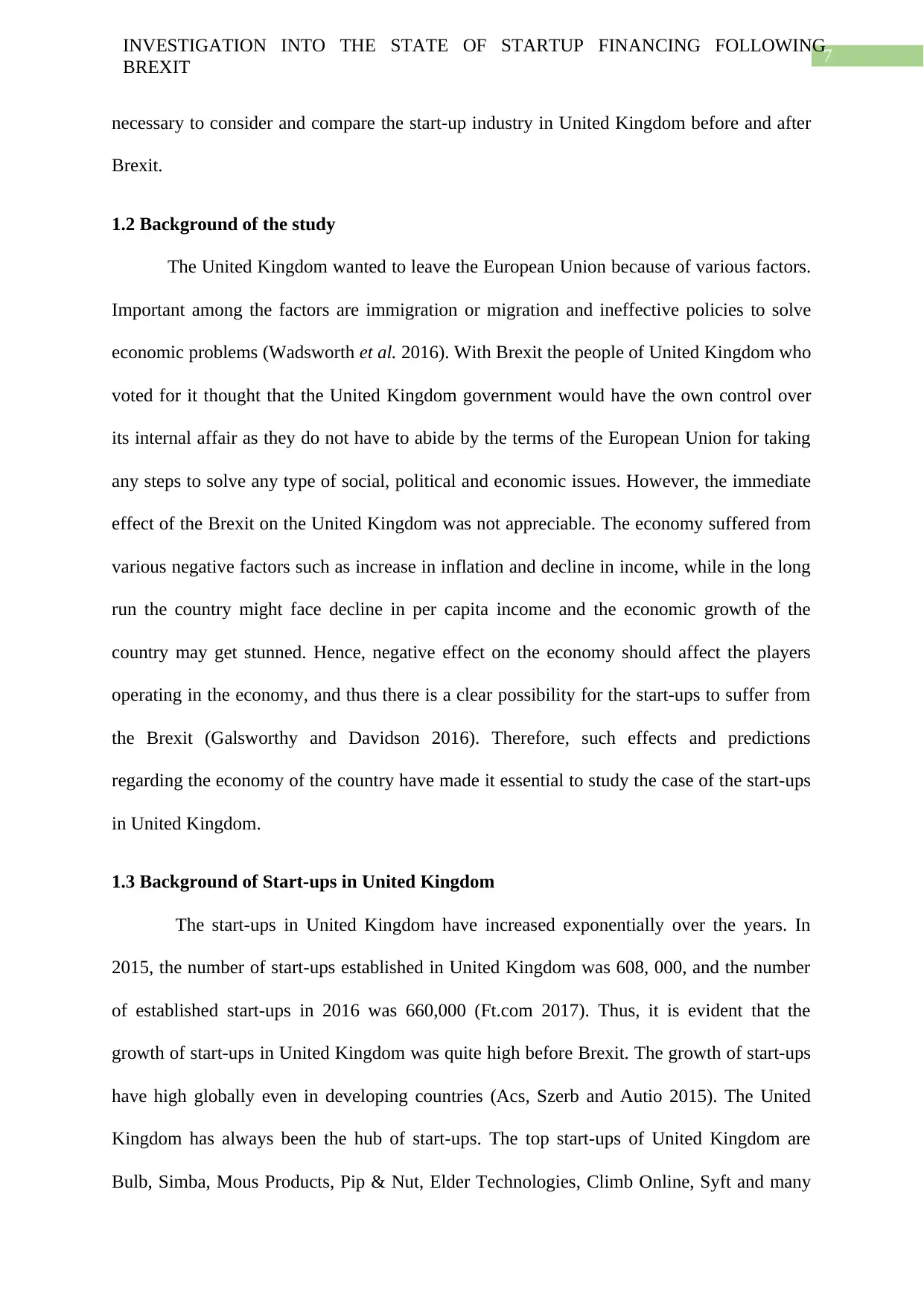
7
INVESTIGATION INTO THE STATE OF STARTUP FINANCING FOLLOWING
BREXIT
necessary to consider and compare the start-up industry in United Kingdom before and after
Brexit.
1.2 Background of the study
The United Kingdom wanted to leave the European Union because of various factors.
Important among the factors are immigration or migration and ineffective policies to solve
economic problems (Wadsworth et al. 2016). With Brexit the people of United Kingdom who
voted for it thought that the United Kingdom government would have the own control over
its internal affair as they do not have to abide by the terms of the European Union for taking
any steps to solve any type of social, political and economic issues. However, the immediate
effect of the Brexit on the United Kingdom was not appreciable. The economy suffered from
various negative factors such as increase in inflation and decline in income, while in the long
run the country might face decline in per capita income and the economic growth of the
country may get stunned. Hence, negative effect on the economy should affect the players
operating in the economy, and thus there is a clear possibility for the start-ups to suffer from
the Brexit (Galsworthy and Davidson 2016). Therefore, such effects and predictions
regarding the economy of the country have made it essential to study the case of the start-ups
in United Kingdom.
1.3 Background of Start-ups in United Kingdom
The start-ups in United Kingdom have increased exponentially over the years. In
2015, the number of start-ups established in United Kingdom was 608, 000, and the number
of established start-ups in 2016 was 660,000 (Ft.com 2017). Thus, it is evident that the
growth of start-ups in United Kingdom was quite high before Brexit. The growth of start-ups
have high globally even in developing countries (Acs, Szerb and Autio 2015). The United
Kingdom has always been the hub of start-ups. The top start-ups of United Kingdom are
Bulb, Simba, Mous Products, Pip & Nut, Elder Technologies, Climb Online, Syft and many
INVESTIGATION INTO THE STATE OF STARTUP FINANCING FOLLOWING
BREXIT
necessary to consider and compare the start-up industry in United Kingdom before and after
Brexit.
1.2 Background of the study
The United Kingdom wanted to leave the European Union because of various factors.
Important among the factors are immigration or migration and ineffective policies to solve
economic problems (Wadsworth et al. 2016). With Brexit the people of United Kingdom who
voted for it thought that the United Kingdom government would have the own control over
its internal affair as they do not have to abide by the terms of the European Union for taking
any steps to solve any type of social, political and economic issues. However, the immediate
effect of the Brexit on the United Kingdom was not appreciable. The economy suffered from
various negative factors such as increase in inflation and decline in income, while in the long
run the country might face decline in per capita income and the economic growth of the
country may get stunned. Hence, negative effect on the economy should affect the players
operating in the economy, and thus there is a clear possibility for the start-ups to suffer from
the Brexit (Galsworthy and Davidson 2016). Therefore, such effects and predictions
regarding the economy of the country have made it essential to study the case of the start-ups
in United Kingdom.
1.3 Background of Start-ups in United Kingdom
The start-ups in United Kingdom have increased exponentially over the years. In
2015, the number of start-ups established in United Kingdom was 608, 000, and the number
of established start-ups in 2016 was 660,000 (Ft.com 2017). Thus, it is evident that the
growth of start-ups in United Kingdom was quite high before Brexit. The growth of start-ups
have high globally even in developing countries (Acs, Szerb and Autio 2015). The United
Kingdom has always been the hub of start-ups. The top start-ups of United Kingdom are
Bulb, Simba, Mous Products, Pip & Nut, Elder Technologies, Climb Online, Syft and many
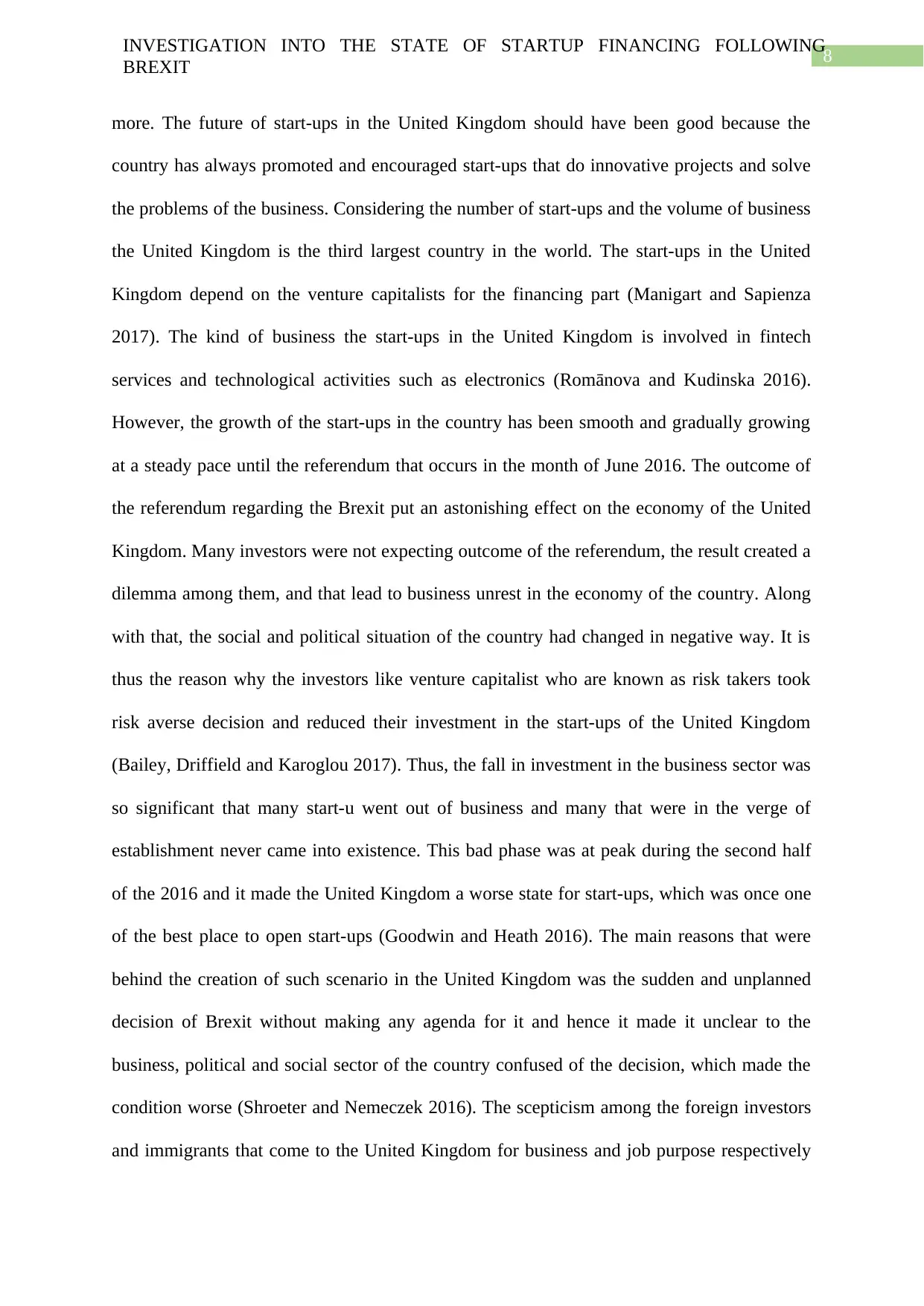
8
INVESTIGATION INTO THE STATE OF STARTUP FINANCING FOLLOWING
BREXIT
more. The future of start-ups in the United Kingdom should have been good because the
country has always promoted and encouraged start-ups that do innovative projects and solve
the problems of the business. Considering the number of start-ups and the volume of business
the United Kingdom is the third largest country in the world. The start-ups in the United
Kingdom depend on the venture capitalists for the financing part (Manigart and Sapienza
2017). The kind of business the start-ups in the United Kingdom is involved in fintech
services and technological activities such as electronics (Romānova and Kudinska 2016).
However, the growth of the start-ups in the country has been smooth and gradually growing
at a steady pace until the referendum that occurs in the month of June 2016. The outcome of
the referendum regarding the Brexit put an astonishing effect on the economy of the United
Kingdom. Many investors were not expecting outcome of the referendum, the result created a
dilemma among them, and that lead to business unrest in the economy of the country. Along
with that, the social and political situation of the country had changed in negative way. It is
thus the reason why the investors like venture capitalist who are known as risk takers took
risk averse decision and reduced their investment in the start-ups of the United Kingdom
(Bailey, Driffield and Karoglou 2017). Thus, the fall in investment in the business sector was
so significant that many start-u went out of business and many that were in the verge of
establishment never came into existence. This bad phase was at peak during the second half
of the 2016 and it made the United Kingdom a worse state for start-ups, which was once one
of the best place to open start-ups (Goodwin and Heath 2016). The main reasons that were
behind the creation of such scenario in the United Kingdom was the sudden and unplanned
decision of Brexit without making any agenda for it and hence it made it unclear to the
business, political and social sector of the country confused of the decision, which made the
condition worse (Shroeter and Nemeczek 2016). The scepticism among the foreign investors
and immigrants that come to the United Kingdom for business and job purpose respectively
INVESTIGATION INTO THE STATE OF STARTUP FINANCING FOLLOWING
BREXIT
more. The future of start-ups in the United Kingdom should have been good because the
country has always promoted and encouraged start-ups that do innovative projects and solve
the problems of the business. Considering the number of start-ups and the volume of business
the United Kingdom is the third largest country in the world. The start-ups in the United
Kingdom depend on the venture capitalists for the financing part (Manigart and Sapienza
2017). The kind of business the start-ups in the United Kingdom is involved in fintech
services and technological activities such as electronics (Romānova and Kudinska 2016).
However, the growth of the start-ups in the country has been smooth and gradually growing
at a steady pace until the referendum that occurs in the month of June 2016. The outcome of
the referendum regarding the Brexit put an astonishing effect on the economy of the United
Kingdom. Many investors were not expecting outcome of the referendum, the result created a
dilemma among them, and that lead to business unrest in the economy of the country. Along
with that, the social and political situation of the country had changed in negative way. It is
thus the reason why the investors like venture capitalist who are known as risk takers took
risk averse decision and reduced their investment in the start-ups of the United Kingdom
(Bailey, Driffield and Karoglou 2017). Thus, the fall in investment in the business sector was
so significant that many start-u went out of business and many that were in the verge of
establishment never came into existence. This bad phase was at peak during the second half
of the 2016 and it made the United Kingdom a worse state for start-ups, which was once one
of the best place to open start-ups (Goodwin and Heath 2016). The main reasons that were
behind the creation of such scenario in the United Kingdom was the sudden and unplanned
decision of Brexit without making any agenda for it and hence it made it unclear to the
business, political and social sector of the country confused of the decision, which made the
condition worse (Shroeter and Nemeczek 2016). The scepticism among the foreign investors
and immigrants that come to the United Kingdom for business and job purpose respectively
⊘ This is a preview!⊘
Do you want full access?
Subscribe today to unlock all pages.

Trusted by 1+ million students worldwide
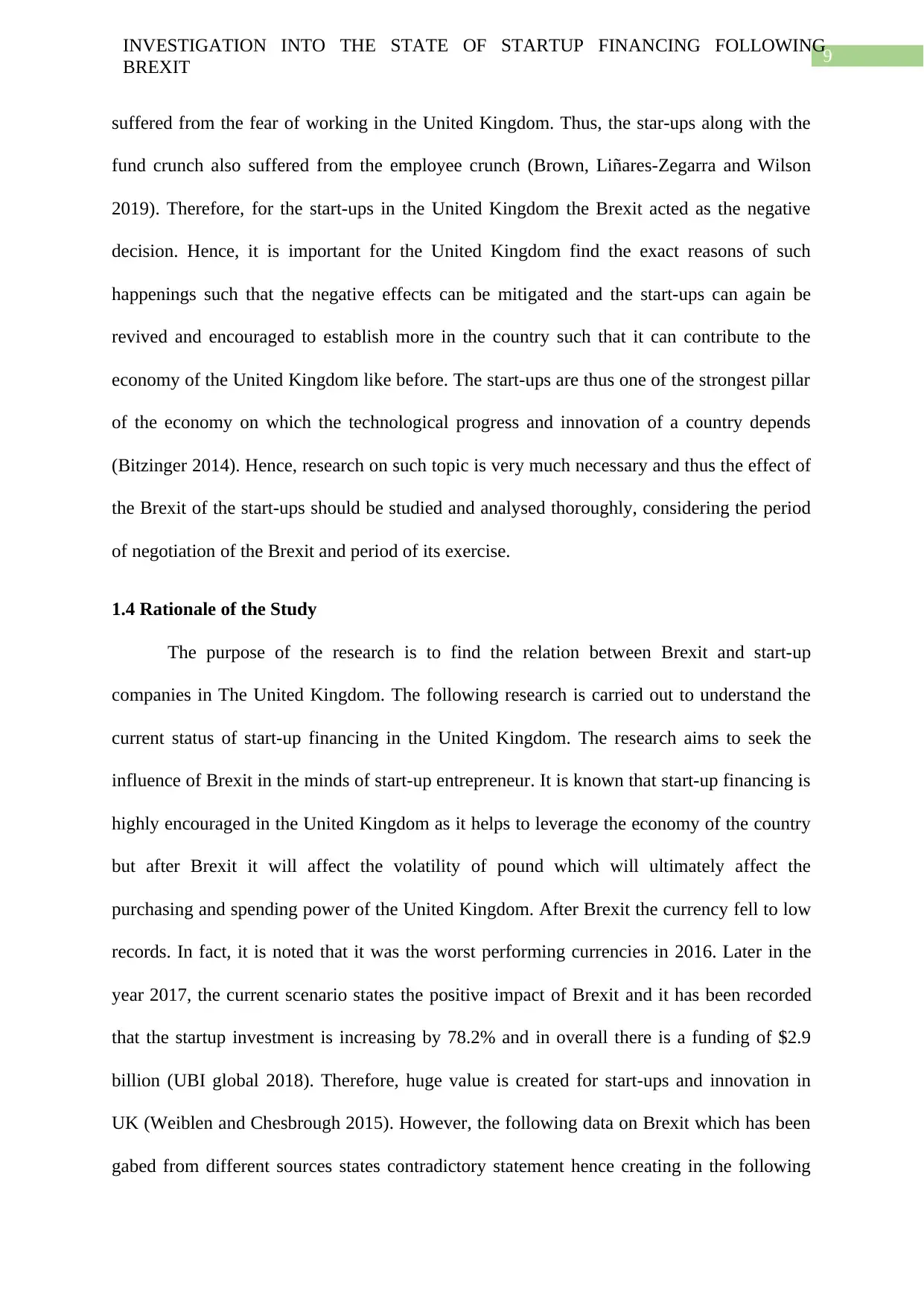
9
INVESTIGATION INTO THE STATE OF STARTUP FINANCING FOLLOWING
BREXIT
suffered from the fear of working in the United Kingdom. Thus, the star-ups along with the
fund crunch also suffered from the employee crunch (Brown, Liñares-Zegarra and Wilson
2019). Therefore, for the start-ups in the United Kingdom the Brexit acted as the negative
decision. Hence, it is important for the United Kingdom find the exact reasons of such
happenings such that the negative effects can be mitigated and the start-ups can again be
revived and encouraged to establish more in the country such that it can contribute to the
economy of the United Kingdom like before. The start-ups are thus one of the strongest pillar
of the economy on which the technological progress and innovation of a country depends
(Bitzinger 2014). Hence, research on such topic is very much necessary and thus the effect of
the Brexit of the start-ups should be studied and analysed thoroughly, considering the period
of negotiation of the Brexit and period of its exercise.
1.4 Rationale of the Study
The purpose of the research is to find the relation between Brexit and start-up
companies in The United Kingdom. The following research is carried out to understand the
current status of start-up financing in the United Kingdom. The research aims to seek the
influence of Brexit in the minds of start-up entrepreneur. It is known that start-up financing is
highly encouraged in the United Kingdom as it helps to leverage the economy of the country
but after Brexit it will affect the volatility of pound which will ultimately affect the
purchasing and spending power of the United Kingdom. After Brexit the currency fell to low
records. In fact, it is noted that it was the worst performing currencies in 2016. Later in the
year 2017, the current scenario states the positive impact of Brexit and it has been recorded
that the startup investment is increasing by 78.2% and in overall there is a funding of $2.9
billion (UBI global 2018). Therefore, huge value is created for start-ups and innovation in
UK (Weiblen and Chesbrough 2015). However, the following data on Brexit which has been
gabed from different sources states contradictory statement hence creating in the following
INVESTIGATION INTO THE STATE OF STARTUP FINANCING FOLLOWING
BREXIT
suffered from the fear of working in the United Kingdom. Thus, the star-ups along with the
fund crunch also suffered from the employee crunch (Brown, Liñares-Zegarra and Wilson
2019). Therefore, for the start-ups in the United Kingdom the Brexit acted as the negative
decision. Hence, it is important for the United Kingdom find the exact reasons of such
happenings such that the negative effects can be mitigated and the start-ups can again be
revived and encouraged to establish more in the country such that it can contribute to the
economy of the United Kingdom like before. The start-ups are thus one of the strongest pillar
of the economy on which the technological progress and innovation of a country depends
(Bitzinger 2014). Hence, research on such topic is very much necessary and thus the effect of
the Brexit of the start-ups should be studied and analysed thoroughly, considering the period
of negotiation of the Brexit and period of its exercise.
1.4 Rationale of the Study
The purpose of the research is to find the relation between Brexit and start-up
companies in The United Kingdom. The following research is carried out to understand the
current status of start-up financing in the United Kingdom. The research aims to seek the
influence of Brexit in the minds of start-up entrepreneur. It is known that start-up financing is
highly encouraged in the United Kingdom as it helps to leverage the economy of the country
but after Brexit it will affect the volatility of pound which will ultimately affect the
purchasing and spending power of the United Kingdom. After Brexit the currency fell to low
records. In fact, it is noted that it was the worst performing currencies in 2016. Later in the
year 2017, the current scenario states the positive impact of Brexit and it has been recorded
that the startup investment is increasing by 78.2% and in overall there is a funding of $2.9
billion (UBI global 2018). Therefore, huge value is created for start-ups and innovation in
UK (Weiblen and Chesbrough 2015). However, the following data on Brexit which has been
gabed from different sources states contradictory statement hence creating in the following
Paraphrase This Document
Need a fresh take? Get an instant paraphrase of this document with our AI Paraphraser
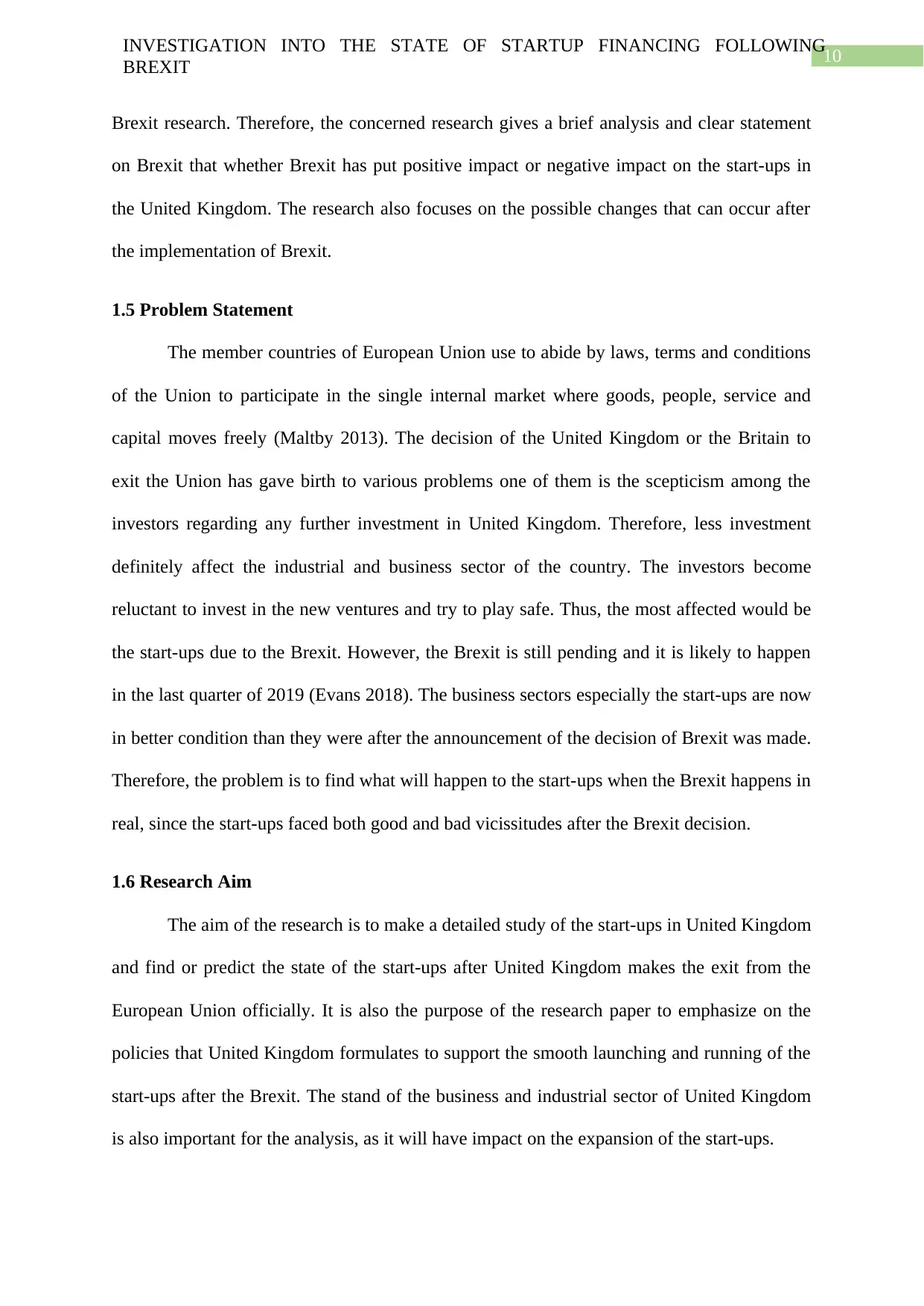
10
INVESTIGATION INTO THE STATE OF STARTUP FINANCING FOLLOWING
BREXIT
Brexit research. Therefore, the concerned research gives a brief analysis and clear statement
on Brexit that whether Brexit has put positive impact or negative impact on the start-ups in
the United Kingdom. The research also focuses on the possible changes that can occur after
the implementation of Brexit.
1.5 Problem Statement
The member countries of European Union use to abide by laws, terms and conditions
of the Union to participate in the single internal market where goods, people, service and
capital moves freely (Maltby 2013). The decision of the United Kingdom or the Britain to
exit the Union has gave birth to various problems one of them is the scepticism among the
investors regarding any further investment in United Kingdom. Therefore, less investment
definitely affect the industrial and business sector of the country. The investors become
reluctant to invest in the new ventures and try to play safe. Thus, the most affected would be
the start-ups due to the Brexit. However, the Brexit is still pending and it is likely to happen
in the last quarter of 2019 (Evans 2018). The business sectors especially the start-ups are now
in better condition than they were after the announcement of the decision of Brexit was made.
Therefore, the problem is to find what will happen to the start-ups when the Brexit happens in
real, since the start-ups faced both good and bad vicissitudes after the Brexit decision.
1.6 Research Aim
The aim of the research is to make a detailed study of the start-ups in United Kingdom
and find or predict the state of the start-ups after United Kingdom makes the exit from the
European Union officially. It is also the purpose of the research paper to emphasize on the
policies that United Kingdom formulates to support the smooth launching and running of the
start-ups after the Brexit. The stand of the business and industrial sector of United Kingdom
is also important for the analysis, as it will have impact on the expansion of the start-ups.
INVESTIGATION INTO THE STATE OF STARTUP FINANCING FOLLOWING
BREXIT
Brexit research. Therefore, the concerned research gives a brief analysis and clear statement
on Brexit that whether Brexit has put positive impact or negative impact on the start-ups in
the United Kingdom. The research also focuses on the possible changes that can occur after
the implementation of Brexit.
1.5 Problem Statement
The member countries of European Union use to abide by laws, terms and conditions
of the Union to participate in the single internal market where goods, people, service and
capital moves freely (Maltby 2013). The decision of the United Kingdom or the Britain to
exit the Union has gave birth to various problems one of them is the scepticism among the
investors regarding any further investment in United Kingdom. Therefore, less investment
definitely affect the industrial and business sector of the country. The investors become
reluctant to invest in the new ventures and try to play safe. Thus, the most affected would be
the start-ups due to the Brexit. However, the Brexit is still pending and it is likely to happen
in the last quarter of 2019 (Evans 2018). The business sectors especially the start-ups are now
in better condition than they were after the announcement of the decision of Brexit was made.
Therefore, the problem is to find what will happen to the start-ups when the Brexit happens in
real, since the start-ups faced both good and bad vicissitudes after the Brexit decision.
1.6 Research Aim
The aim of the research is to make a detailed study of the start-ups in United Kingdom
and find or predict the state of the start-ups after United Kingdom makes the exit from the
European Union officially. It is also the purpose of the research paper to emphasize on the
policies that United Kingdom formulates to support the smooth launching and running of the
start-ups after the Brexit. The stand of the business and industrial sector of United Kingdom
is also important for the analysis, as it will have impact on the expansion of the start-ups.
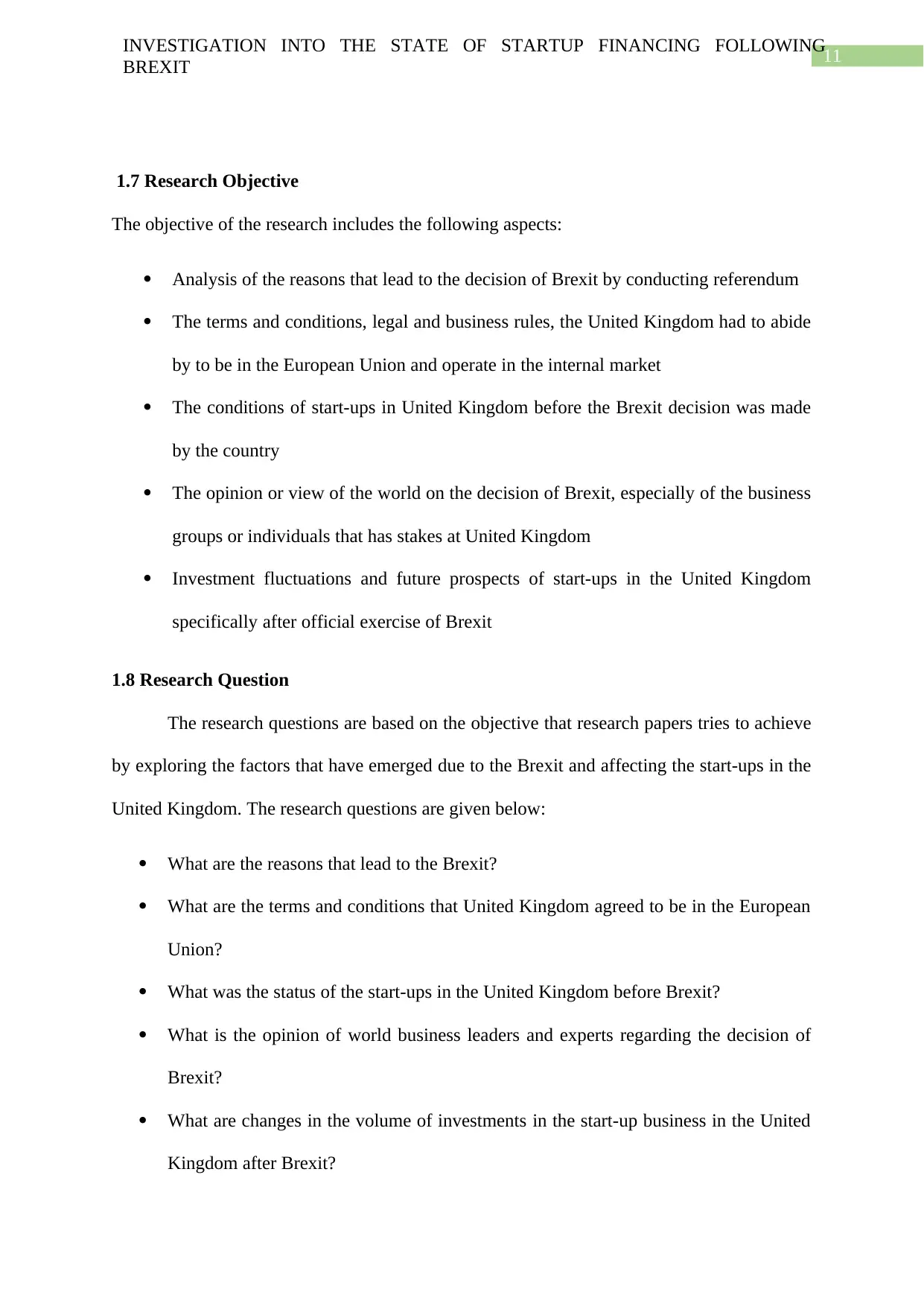
11
INVESTIGATION INTO THE STATE OF STARTUP FINANCING FOLLOWING
BREXIT
1.7 Research Objective
The objective of the research includes the following aspects:
Analysis of the reasons that lead to the decision of Brexit by conducting referendum
The terms and conditions, legal and business rules, the United Kingdom had to abide
by to be in the European Union and operate in the internal market
The conditions of start-ups in United Kingdom before the Brexit decision was made
by the country
The opinion or view of the world on the decision of Brexit, especially of the business
groups or individuals that has stakes at United Kingdom
Investment fluctuations and future prospects of start-ups in the United Kingdom
specifically after official exercise of Brexit
1.8 Research Question
The research questions are based on the objective that research papers tries to achieve
by exploring the factors that have emerged due to the Brexit and affecting the start-ups in the
United Kingdom. The research questions are given below:
What are the reasons that lead to the Brexit?
What are the terms and conditions that United Kingdom agreed to be in the European
Union?
What was the status of the start-ups in the United Kingdom before Brexit?
What is the opinion of world business leaders and experts regarding the decision of
Brexit?
What are changes in the volume of investments in the start-up business in the United
Kingdom after Brexit?
INVESTIGATION INTO THE STATE OF STARTUP FINANCING FOLLOWING
BREXIT
1.7 Research Objective
The objective of the research includes the following aspects:
Analysis of the reasons that lead to the decision of Brexit by conducting referendum
The terms and conditions, legal and business rules, the United Kingdom had to abide
by to be in the European Union and operate in the internal market
The conditions of start-ups in United Kingdom before the Brexit decision was made
by the country
The opinion or view of the world on the decision of Brexit, especially of the business
groups or individuals that has stakes at United Kingdom
Investment fluctuations and future prospects of start-ups in the United Kingdom
specifically after official exercise of Brexit
1.8 Research Question
The research questions are based on the objective that research papers tries to achieve
by exploring the factors that have emerged due to the Brexit and affecting the start-ups in the
United Kingdom. The research questions are given below:
What are the reasons that lead to the Brexit?
What are the terms and conditions that United Kingdom agreed to be in the European
Union?
What was the status of the start-ups in the United Kingdom before Brexit?
What is the opinion of world business leaders and experts regarding the decision of
Brexit?
What are changes in the volume of investments in the start-up business in the United
Kingdom after Brexit?
⊘ This is a preview!⊘
Do you want full access?
Subscribe today to unlock all pages.

Trusted by 1+ million students worldwide
1 out of 72
Related Documents
Your All-in-One AI-Powered Toolkit for Academic Success.
+13062052269
info@desklib.com
Available 24*7 on WhatsApp / Email
![[object Object]](/_next/static/media/star-bottom.7253800d.svg)
Unlock your academic potential
Copyright © 2020–2026 A2Z Services. All Rights Reserved. Developed and managed by ZUCOL.





